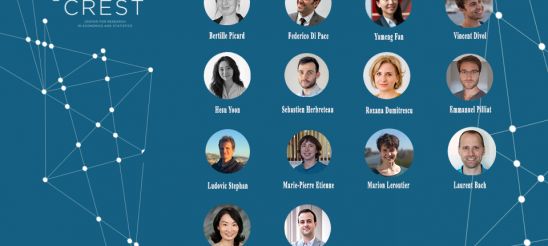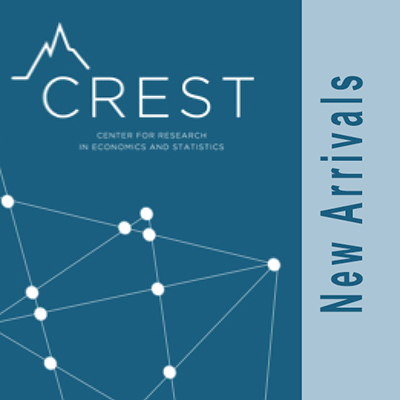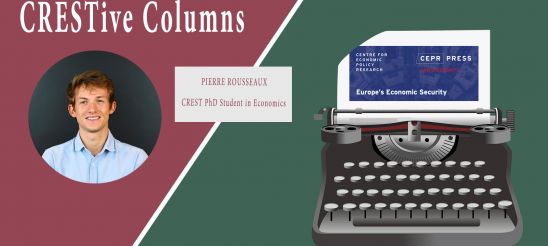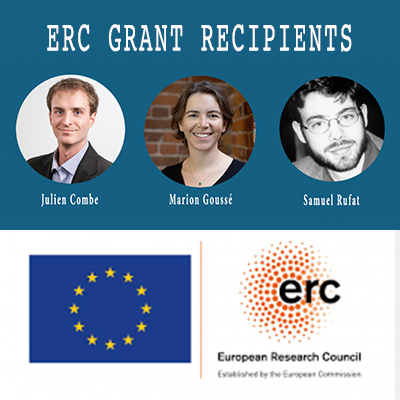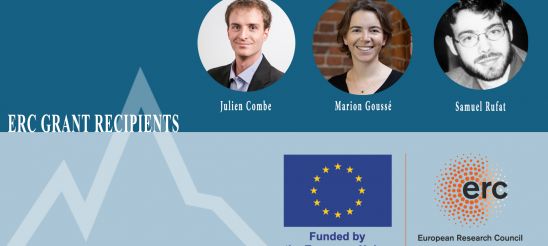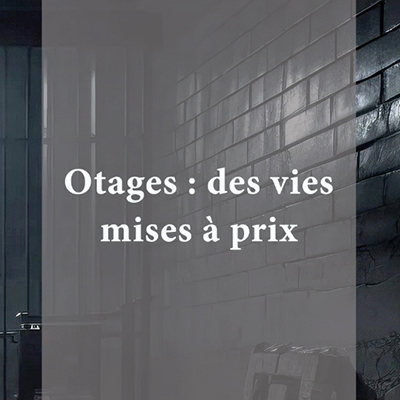Each year, CREST goes beyond its borders to find new minds to keep on offering pioneer research. This year, CREST was able to attract new talents from all around the world (Canada, France, Italy, Switzerland, UEA, UK and USA). These new recruits bring with them a wealth of knowledge, diverse experiences, and a passion for pushing the boundaries of their respective fields. New recruits is always very much appreciated by our PhD students and students from ENSAE Paris, ENSAI and École polytechnique, where they may teach as they arrive with a different background and knowledge base.
As CREST continues to produce groundbreaking research about and for society, the arrival of these scholars marks a significant milestone in our journey. Each professor brings unique expertise that will not only enhance our ongoing projects but also open new avenues for exploration and discovery.
In this article, we will introduce you to our new researchers, delve into their backgrounds, and share their specializations that will contribute to the vibrant research environment at CREST.
Economics
Laurent Bach, Visiting Professor (ESSEC)

Interests: Entrepreneurial Finance, Corporate Governance, Household Finance, Public Economics, Political Economy
Current position: Laurent is currently and Associate Professor of Finance at ESSEC Business School
Laurent completed is PhD from Paris School of Economics in 2010
Federico Di Pace, Associate Professor (ENSAI)
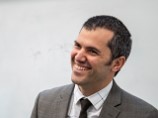
Interests: Monetary Economics, macro-labor, international economics and applied econometrics
Previous position: Federico was previously a Senior Economist at the Bank of England.
Experienced Senior Economist with a demonstrated history of working in the academia and central banking, Federico conducted economic research with particular focus on labor markets and its interaction with monetary policy. He has conducted academic policy pieces using applied theory and time series econometrics. Federico completed his PhD in Economics at Birkbeck College, University of London.
https://sites.google.com/site/federicodipace/home?authuser=0
Yameng Fan, Assistant Professor (ENSAI)

Interests: Macroeconomics of labor markets, political economy, market power and spatial economics.
Previous position: PhD in Economics from Universitat Pompeu Fabra.
Florian Grosset, Assistant Professor (ENSAE Paris, Institut Polytechnique de Paris)

Interests: Development and environmental economics with interests in labor and firms
Previous position: PhD in Sustainable Development from Columbia University
The first strand of his research focuses on labor and networks in lower-income countries. His work explores how individuals’ labor supply decisions are influenced by their social network members, primarily with field experiments. The second strand of Florian’s research focuses on firms’ responses to environmental changes. It combines insights from the natural sciences with applied micro-economic tools for causal identification.
Marion Leroutier, Assistant Professor (ENSAE Paris, Institut Polytechnique de Paris)

Interests: Applied Environmental Economics focusing on two major environmental issues, ambient air pollution and climate change.
Previous position: Postdoctoral fellow at the Institute for Fiscal Studies.
Marion’s research agenda has two angles. First, she investigates the societal cost of air pollution and the causal impact of climate and environmental policies, with an emphasis on health, productivity and distributional effects. In a second and more early-stage angle, Marion studies the determinants of support for green policies, in particular the role of social norms and identity.
Bertille Picard, Assistant Professor (ENSAI)

Interests: Econometrics, Machine Learning applied to policy evaluation and inequalities.
Previous position: PhD in Economics at Aix-Marseille School of Economics (AMSE)
Yuki Tamura, Assistant Professor (École polytechnique, Institut Polytechnique de Paris)

Interests: Micoeconomic Theory, Market Design, Social Choice and Political Economy.
Previous position: Postdoctoral Associate at the Center for Behavioral Institutional Design, NUY Abu Dhabi.
Finance-Insurance
Roxana Dumitrescu, Associate Professor (ENSAE Paris, Institut Polytechnique de Paris)

Interests: Financial Mathematics, Stochastic Control, Stochastic Differential Games, Mean-field Games, Backward Stochastic Differential Equations, Energy Markets, Machine Learning.
Previous position: Associate Professor in Financial Mathematics at King’s College of London.
Sociology
Samuel Rufat, Assistant Professor (École polytechnique, Institut Polytechnique de Paris)

Interests: Urban Geography, Urban Studies, Spatial Analysis, Socio-Economic Inequalities, Segregation, Socio-Spatial Reconfigurations, Environmental justice, …
Previous position: Lecturer at CY Cergy Université Paris Cité (Géographie-cités)
Hesu Yoon, Assistant Professor (ENSAE Paris, Institut Polytechnique de Paris)

Interests: Inequality, Poverty, and mobility, Community and Urban Sociology, Race, Gender and Class, Cultural Sociology, Social Psychology, Computational Social Science, Mixed Methods.
Previous position: PhD in Sociology at Stanford University.
Hesu’s research asks longstanding questions about spatial inequality in urban sociology: Why do some neighborhoods (or cities) grow by attracting people and capital while others do not? How does this place stratification intersect with racial and class-based inequalities? Combining experimental, computational, and qualitative approaches, she interrogates high-status consumers and place entrepreneurs – such as business owners, landlords, and travel writers – who have the power to mold physical, economic, and symbolic urban landscapes.
Statistics
Vincent Divol, Assistant Professor (ENSAE Paris, Institut Polytechnique de Paris)

Interests: Topics at the intersection of statistics and geometry, including statistical optimal transport, geometric inference and topological data analysis.
Previous position: Junior AI Fellow at Université PSL.
Marie-Pierre Etienne, Associate Professor (ENSAI)

Interests: Development of statistical methods for ecology.
Previous position: Assistant Professor at Agrocampus Ouest.
Marie-Pierre is mainly interested in the use of stochastic processes to model and infer biological processes, particularly ecological processes.
Recently she focused mainly on movement ecology application and the development of statistical methods to extract knowledge from the study of animals, but also fishing vessels movement.
Sébastien Herbreteau, Assistant Professor (ENSAI)

Interests: Statistical and Machine Learning Methods for image processing, inverse problems, optimization and mathematical understanding of neural networks.
Previous position: Postdoctoral Fellow in the Biomedical Imaging Group at the Ecole Polytechnique Fédérale de Lausanne.
Emmanuel Pilliat, Assistant Professor (ENSAI)

Interests: Machine Learning and High-Dimensional Statistics.
Previous position: Postdoctoral Fellow at ENS Lyon.
Ludovic Stephan, Assistant Professor (ENSAI)

Interests: Random graphs, inference problems, machine learning theory.
Previous position: Postdoctoral Fellow in the idePHICS lab at Ecole Polytechnique Fédérale de Lausanne.
My research interests involve the rigorous study of statistical-physics inspired methods, from belief propagation to replica equations.
Welcome at CREST: Introducing our latest recruits.
Each year, CREST goes beyond its borders to find new minds to keep on offering pioneer research. This year, CREST was able to attract new talents from all around the world (Canada, France, Italy, Switzerland, UEA, UK and USA). These new recruits bring with them a wealth of knowledge, diverse experiences, and a passion for pushing the boundaries of their respective fields. New recruits is always very much appreciated by our PhD students and students from ENSAE Paris, ENSAI and École polytechnique, where they may teach as they arrive with a different background and knowledge base.
As CREST continues to produce groundbreaking research about and for society, the arrival of these scholars marks a significant milestone in our journey. Each professor brings unique expertise that will not only enhance our ongoing projects but also open new avenues for exploration and discovery.
In this article, we will introduce you to our new researchers, delve into their backgrounds, and share their specializations that will contribute to the vibrant research environment at CREST.
Economics
Laurent Bach, Visiting Professor (ESSEC)

Interests: Entrepreneurial Finance, Corporate Governance, Household Finance, Public Economics, Political Economy
Current position: Laurent is currently and Associate Professor of Finance at ESSEC Business School
Laurent completed is PhD from Paris School of Economics in 2010
Federico Di Pace, Associate Professor (ENSAI)

Interests: Monetary Economics, macro-labor, international economics and applied econometrics
Previous position: Federico was previously a Senior Economist at the Bank of England.
Experienced Senior Economist with a demonstrated history of working in the academia and central banking, Federico conducted economic research with particular focus on labor markets and its interaction with monetary policy. He has conducted academic policy pieces using applied theory and time series econometrics. Federico completed his PhD in Economics at Birkbeck College, University of London.
https://sites.google.com/site/federicodipace/home?authuser=0
Yameng Fan, Assistant Professor (ENSAI)

Interests: Macroeconomics of labor markets, political economy, market power and spatial economics.
Previous position: PhD in Economics from Universitat Pompeu Fabra.
Florian Grosset, Assistant Professor (ENSAE Paris, Institut Polytechnique de Paris)

Interests: Development and environmental economics with interests in labor and firms
Previous position: PhD in Sustainable Development from Columbia University
The first strand of his research focuses on labor and networks in lower-income countries. His work explores how individuals’ labor supply decisions are influenced by their social network members, primarily with field experiments. The second strand of Florian’s research focuses on firms’ responses to environmental changes. It combines insights from the natural sciences with applied micro-economic tools for causal identification.
Marion Leroutier, Assistant Professor (ENSAE Paris, Institut Polytechnique de Paris)

Interests: Applied Environmental Economics focusing on two major environmental issues, ambient air pollution and climate change.
Previous position: Postdoctoral fellow at the Institute for Fiscal Studies.
Marion’s research agenda has two angles. First, she investigates the societal cost of air pollution and the causal impact of climate and environmental policies, with an emphasis on health, productivity and distributional effects. In a second and more early-stage angle, Marion studies the determinants of support for green policies, in particular the role of social norms and identity.
Bertille Picard, Assistant Professor (ENSAI)

Interests: Econometrics, Machine Learning applied to policy evaluation and inequalities.
Previous position: PhD in Economics at Aix-Marseille School of Economics (AMSE)
Yuki Tamura, Assistant Professor (École polytechnique, Institut Polytechnique de Paris)

Interests: Micoeconomic Theory, Market Design, Social Choice and Political Economy.
Previous position: Postdoctoral Associate at the Center for Behavioral Institutional Design, NUY Abu Dhabi.
Finance-Insurance
Roxana Dumitrescu, Associate Professor (ENSAE Paris, Institut Polytechnique de Paris)

Interests: Financial Mathematics, Stochastic Control, Stochastic Differential Games, Mean-field Games, Backward Stochastic Differential Equations, Energy Markets, Machine Learning.
Previous position: Associate Professor in Financial Mathematics at King’s College of London.
Sociology
Samuel Rufat, Assistant Professor (École polytechnique, Institut Polytechnique de Paris)

Interests: Urban Geography, Urban Studies, Spatial Analysis, Socio-Economic Inequalities, Segregation, Socio-Spatial Reconfigurations, Environmental justice, …
Previous position: Lecturer at CY Cergy Université Paris Cité (Géographie-cités)
Hesu Yoon, Assistant Professor (ENSAE Paris, Institut Polytechnique de Paris)

Interests: Inequality, Poverty, and mobility, Community and Urban Sociology, Race, Gender and Class, Cultural Sociology, Social Psychology, Computational Social Science, Mixed Methods.
Previous position: PhD in Sociology at Stanford University.
Hesu’s research asks longstanding questions about spatial inequality in urban sociology: Why do some neighborhoods (or cities) grow by attracting people and capital while others do not? How does this place stratification intersect with racial and class-based inequalities? Combining experimental, computational, and qualitative approaches, she interrogates high-status consumers and place entrepreneurs – such as business owners, landlords, and travel writers – who have the power to mold physical, economic, and symbolic urban landscapes.
Statistics
Vincent Divol, Assistant Professor (ENSAE Paris, Institut Polytechnique de Paris)

Interests: Topics at the intersection of statistics and geometry, including statistical optimal transport, geometric inference and topological data analysis.
Previous position: Junior AI Fellow at Université PSL.
Marie-Pierre Etienne, Associate Professor (ENSAI)

Interests: Development of statistical methods for ecology.
Previous position: Assistant Professor at Agrocampus Ouest.
Marie-Pierre is mainly interested in the use of stochastic processes to model and infer biological processes, particularly ecological processes.
Recently she focused mainly on movement ecology application and the development of statistical methods to extract knowledge from the study of animals, but also fishing vessels movement.
Sébastien Herbreteau, Assistant Professor (ENSAI)

Interests: Statistical and Machine Learning Methods for image processing, inverse problems, optimization and mathematical understanding of neural networks.
Previous position: Postdoctoral Fellow in the Biomedical Imaging Group at the Ecole Polytechnique Fédérale de Lausanne.
Emmanuel Pilliat, Assistant Professor (ENSAI)

Interests: Machine Learning and High-Dimensional Statistics.
Previous position: Postdoctoral Fellow at ENS Lyon.
Ludovic Stephan, Assistant Professor (ENSAI)

Interests: Random graphs, inference problems, machine learning theory.
Previous position: Postdoctoral Fellow in the idePHICS lab at Ecole Polytechnique Fédérale de Lausanne.
My research interests involve the rigorous study of statistical-physics inspired methods, from belief propagation to replica equations.
CRESTive Columns: Pierre Rousseaux and Strengthening the European Union’s economic resilience: How to address trade dependencies?

Pierre Rousseaux is a PhD candidate in economics at CREST, Institut Polytechnique de Paris (France).
As part of his PhD, his research focuses on labor economics, econometrics, and policy evaluation. Specifically, he studies the job search behavior of job seekers, informational frictions in the hiring process, and the effects and design of unemployment insurance. Additionally, his research also pertains to international trade, using product-level trade and production data to study vulnerabilities within global value chains and their evolution in response to various risks. He is also the director, co-founder, and editor in chied of Oeconomicus, an online journal that promotes the results of economic research, makes it accessible to public debate, and brings together actors of the academic community to enhance the understanding of research in economics as well as their own research.
Strengthening the European Union’s economic resilience: How to address trade dependencies?
Supply chain disruptions from the pandemic, the energy crisis triggered by Russia’s invasion of Ukraine, and economic pressures from China have pushed economic security to the forefront of the EU’s agenda. These sudden and large-scale shocks required swift action from European Union (EU) member states. The challenge now is for the EU to proactively anticipate and mitigate trade risks while maintaining the benefits of traditional gains, the key element being to accurately identify trade vulnerabilities. In the third chapter (Mejean and Rousseaux, 2024) of the CEPR-Bruegel Paris Report 2, together with Isabelle Mejean we develop a methodology that identifies EU product-level trade dependencies, isolate them according to their risks, and discuss policies that could mitigate these vulnerabilities.

Hyper-globalization of Global Value Chains (GVCs): Enhanced efficiency at the expense of lower resilience?
GVCs are intricate networks coordinating production across various stages from inception to consumer purchase, involving multiple buyers and suppliers. Over the past three decades, GVCs have hyper-globalized, leading to geographically dispersed production. This fragmentation has increased trade gains and provided risk-sharing against country-specific shocks (Backus et al., 1992; Antràs and Chor, 2021). However, it has also concentrated production in specific nodes, heightening the exposure of countries and firms to local supply shocks. With production dominated by a few actors, disruptions in one node can ripple downstream (di Giovanni et al., 2020; Bonadio et al., 2021; Boehm et al., 2019).
These concentrated dependencies, known as “global trade dependencies,” have spurred policy and academic debates, particularly during crises like the Covid-19 pandemic, which revealed high reliance on a few countries for critical goods, and Russia’s invasion of Ukraine, which highlighted the risk of trade weaponization. The rise of trade dependencies and resilience policies creates a trade-off between traditional trade benefits and increased resilience. Policymakers have made addressing these dependencies a priority, seeking to balance economic interdependence with strategic autonomy and supply chain resilience. Indeed, the U.S. and the EU have implemented resilience policies, such as the 2021 Executive Order on America’s Supply Chains and the European Chips Act, through import diversification and local production.
Governments must act proactively, as firms often underinvest in resilience due to network and information externalities (Mejean and Rousseaux, 2024). Resilience investments by firms typically benefit others, leading to underinvestment (Grossman et al., 2021). Additionally, firms may be unaware of indirect risks from their suppliers, a non-marginal issue in the EU (Mejean and Rousseaux, 2024). The primary challenge for resilience policies is to accurately identify vulnerabilities and isolate them according to specific risks.
Diagnosing EU trade vulnerabilities: Methodologies and results
Several methodologies have emerged following the Covid-19 pandemic, including those by the French Treasury (Bonneau and Nakaa, 2020), the French Council of Economic Advisors (Jaravel and Mejean, 2021), the European Commission (2021), Mejean and Rousseaux (2024), and the CESifo (Baur and Flach, 2022) [1]. The European Commission (EC) methodology identifies a product as vulnerable if it simultaneously meets criteria for import concentration, the significance of extra-EU imports, and the substitutability of these imports with domestic exports. Using product-level trade (CEPII-BACI) and production data (Eurostat-PRODCOM), we add in our paper to these criteria the potential for domestic and post-shock substitution, focusing on products mainly reliant on extra-EU imports to meet domestic demand (absorption) and with very low supplier substitution potential [2]. These factors play a crucial role for resilience (Moll et al., 2023), and recent trade literature using natural experiments has provided empirical evidence of post-shock substitution patterns (Lafrogne-Joussier et al., 2023). Incorporating these substitution patterns in vulnerability analysis refines dependencies and changes their sectoral distribution.
From Mejean and Rousseaux (2024)
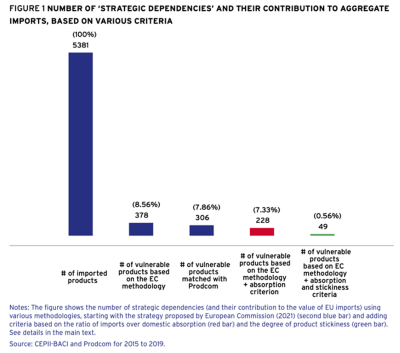
Figure 1 sequentially shows how our additional criteria impact the set of vulnerabilities imported by the EU. Beginning with 5,381 products imported by the consolidated EU from 2015 to 2019 (we aggregate trade and production data to focus on persistent dependencies), the European Commission’s three criteria identify 378 vulnerable products. Restricting the set to products for which 50% of domestic absorption is satisfied by extra-EU imports reduces it to 228 products. Finally, by considering ex-post substitutability in the event of a shock affecting these products, we identify 49 strategic dependencies after narrowing down to those (among the 228) with very low substitutability between suppliers. This last set of vulnerabilities accounts for 0.5% of the EU’s total imports. These products are notably concentrated within the energy, mining, basic metals, and chemicals sectors (Figure 2). Additionally, most of these strategic dependencies are associated with products primarily sourced from China. This final set includes for instance alkaloids, quebracho extract, trichloroethylene, raw beryllium, and bismuth. All identified products and their uses are available in the original paper.
[1] A review and discussion of the others are available in Mejean and Rousseaux (2024) and in Vicard and Wibaux (2024).
[2] A detailed and technical description of these methodologies is provided in the main text and Appendix A1 in Mejean and Rousseaux (2024).
From Mejean and Rousseaux (2024)
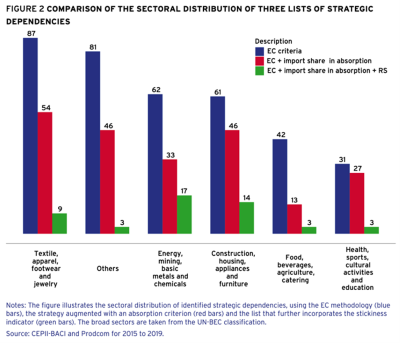
Intersecting vulnerabilities with risks: A normative approach
Existing data is crucial for identifying potential trade vulnerabilities, though not all vulnerabilities pose equal risks to the economy. Several arguments support interventions to enhance resilience. In the paper, we have analyzed the identified vulnerable products through four key risk lenses. All selected products and their use can be found in the original paper.
First, we examined geopolitically risky products by identifying 41 products sourced from non-NATO (North Atlantic Treaty Organization) countries, four of which are sourced from countries with high geopolitical risk. Resilience policies should also consider the estimated economic cost of disruptions, along with the product’s importance in the value chain. To pursue this argument, we have linked vulnerable products to their position within GVCs and identified 22 products that increase EU supply chain risks (Figure 8).
From Mejean and Rousseaux (2024)
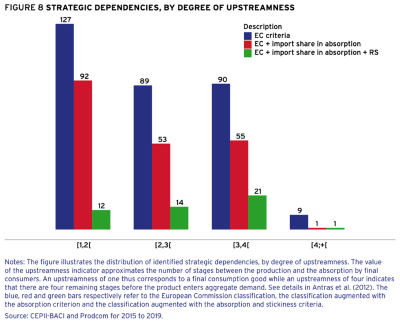
Beyond economic costs, disruptions in critical goods, such as pharmaceuticals, can lead to severe non-economic consequences, including human losses. EU trade dependencies in pharmaceuticals are however limited due to significant European production and flexibility in sourcing active ingredients. We also highlighted a selection of green products (cobalt, lithium, rare earth metals, and graphite) and renewable technologies (lithium-ion batteries for electric vehicles, solar panels, and hydrogen). While not currently identified as vulnerable by our methodology, these products are likely to become so if the EU fails to secure essential inputs. This risk is amplified by the concentration of these resources among a few non-EU suppliers and their low potential for substitution.
Public policies to mitigate trade vulnerabilities
After identifying trade vulnerabilities and isolating products based on the specific risks that resilience policies aim to address, different strategies can be employed to mitigate these vulnerabilities. Various risks and vulnerabilities require tailored approaches. Increase supplier (and technology) diversification, particularly towards geopolitically stable countries, and increase domestic production to reduce reliance on non-EU sources are two key policies. Subsidies that support domestic production, especially in sectors highly dependent on foreign inputs, can enhance overall risk diversification and strengthen the EU’s position within global value chains. This approach is particularly compelling for green industries.
However, coordinating these subsidies, which fall under the purview of EU Member States, is crucial to prevent subsidy escalation and to correct imbalances between Member States. The allocation of public resilience investments should balance the need to reinforce existing industrial clusters with the goal of revitalizing regions that have suffered from declining manufacturing employment. Additionally, alternative strategies include investing in new technologies, public-private collaboration, standardizing production processes to enhance substitutability, and implementing real-time stock monitoring systems.
References
Antràs, Pol and Davin Chor, “Global Value Chains,” NBER Working Papers 28549, National Bureau of Economic Research, Inc March 2021.
Backus, David K, Patrick J Kehoe, and Finn E Kydland, “International Real Business Cycles,” Journal of Political Economy, August 1992, 100 (4), 745–775.
Baur, A. and L. Flach, “German-Chinese Trade Relations: How Dependent is the German Economy on China?,” EconPol Policy Report 6, CESifo 2022.
Boehm, Christoph E., Aaron Flaaen, and Nitya Pandalai-Nayar, “Input Linkages and the Transmission of Shocks: Firm-Level Evidence from the 2011 T ̄ohoku Earthquake,” The Review of Economics and Statistics, March 2019, 101 (1), 60–75.
Bonadio, Barth ́el ́emy, Zhen Huo, Andrei A. Levchenko, and Nitya Pandalai-Nayar, “Global supply chains in the pandemic,” Journal of International Economics, 2021, 133 (C).
Bonneau, C. and M. Nakaa, “Vuln ́erabilit ́e des approvisionnements franc ̧ais et europ ́eens,” Tr ́esor-E ́co 274, French Treasury 2020.
di Giovanni, Julian, Andrei A. Levchenko, Isabelle. Mejean “Foreign Shocks as Granular Fluctuations,” NBER Working Papers 28123, National Bureau of Economic Research, Inc November 2020.
European Commission, “Strategic dependencies and capacities,” Commission Staff Working Document, European Com- mission May 2021.
Grossman, Gene M., Elhanan Helpman, Alejandra Sabal, and Hugo Lhuillier, “Supply Chain Resilience: Should Policy Promote Diversification or Reshoring?,” NBER Working Papers 29330, National Bureau of Economic Research, Inc October 2021.
Jaravel, Xavier and Isabelle Mejean, “A data-driven resilience strategy in a globalized world,” Notes du CAE, Conseil d’Analyse Economique April 2021.
Lafrogne-Joussier, Raphael, Julien Martin, and Isabelle Mejean, “Supply Shocks in Sup- ply Chains: Evidence from the Early Lockdown in China,” IMF Economic Review, March 2023, 71 (1), 170–215.
Mejean, I and P Rousseaux (2024), ‘Identifying European trade dependencies‘, in Pisani-Ferry, J, B Weder di Mauro and J Zettelmeyer (eds), Paris Report 2: Europe’s Economic Security, CEPR Press, Paris & London. https://cepr.org/publications/books-and-reports/paris-report-2-europes-economic-security
Moll, Benjamin, Moritz Schularick, and Georg Zachmann, “The power of substitution. The Great German Gas Debate in Retrospect,” Brooking Papers on Economic Activity, 2023.
CRESTive Columns: Pierre Rousseaux and Strengthening the European Union’s economic resilience: How to address trade dependencies?

Pierre Rousseaux is a PhD candidate in economics at CREST, Institut Polytechnique de Paris (France).
As part of his PhD, his research focuses on labor economics, econometrics, and policy evaluation. Specifically, he studies the job search behavior of job seekers, informational frictions in the hiring process, and the effects and design of unemployment insurance. Additionally, his research also pertains to international trade, using product-level trade and production data to study vulnerabilities within global value chains and their evolution in response to various risks. He is also the director, co-founder, and editor in chied of Oeconomicus, an online journal that promotes the results of economic research, makes it accessible to public debate, and brings together actors of the academic community to enhance the understanding of research in economics as well as their own research.
Strengthening the European Union’s economic resilience: How to address trade dependencies?
Supply chain disruptions from the pandemic, the energy crisis triggered by Russia’s invasion of Ukraine, and economic pressures from China have pushed economic security to the forefront of the EU’s agenda. These sudden and large-scale shocks required swift action from European Union (EU) member states. The challenge now is for the EU to proactively anticipate and mitigate trade risks while maintaining the benefits of traditional gains, the key element being to accurately identify trade vulnerabilities. In the third chapter (Mejean and Rousseaux, 2024) of the CEPR-Bruegel Paris Report 2, together with Isabelle Mejean we develop a methodology that identifies EU product-level trade dependencies, isolate them according to their risks, and discuss policies that could mitigate these vulnerabilities.

Hyper-globalization of Global Value Chains (GVCs): Enhanced efficiency at the expense of lower resilience?
GVCs are intricate networks coordinating production across various stages from inception to consumer purchase, involving multiple buyers and suppliers. Over the past three decades, GVCs have hyper-globalized, leading to geographically dispersed production. This fragmentation has increased trade gains and provided risk-sharing against country-specific shocks (Backus et al., 1992; Antràs and Chor, 2021). However, it has also concentrated production in specific nodes, heightening the exposure of countries and firms to local supply shocks. With production dominated by a few actors, disruptions in one node can ripple downstream (di Giovanni et al., 2020; Bonadio et al., 2021; Boehm et al., 2019).
These concentrated dependencies, known as “global trade dependencies,” have spurred policy and academic debates, particularly during crises like the Covid-19 pandemic, which revealed high reliance on a few countries for critical goods, and Russia’s invasion of Ukraine, which highlighted the risk of trade weaponization. The rise of trade dependencies and resilience policies creates a trade-off between traditional trade benefits and increased resilience. Policymakers have made addressing these dependencies a priority, seeking to balance economic interdependence with strategic autonomy and supply chain resilience. Indeed, the U.S. and the EU have implemented resilience policies, such as the 2021 Executive Order on America’s Supply Chains and the European Chips Act, through import diversification and local production.
Governments must act proactively, as firms often underinvest in resilience due to network and information externalities (Mejean and Rousseaux, 2024). Resilience investments by firms typically benefit others, leading to underinvestment (Grossman et al., 2021). Additionally, firms may be unaware of indirect risks from their suppliers, a non-marginal issue in the EU (Mejean and Rousseaux, 2024). The primary challenge for resilience policies is to accurately identify vulnerabilities and isolate them according to specific risks.
Diagnosing EU trade vulnerabilities: Methodologies and results
Several methodologies have emerged following the Covid-19 pandemic, including those by the French Treasury (Bonneau and Nakaa, 2020), the French Council of Economic Advisors (Jaravel and Mejean, 2021), the European Commission (2021), Mejean and Rousseaux (2024), and the CESifo (Baur and Flach, 2022) [1]. The European Commission (EC) methodology identifies a product as vulnerable if it simultaneously meets criteria for import concentration, the significance of extra-EU imports, and the substitutability of these imports with domestic exports. Using product-level trade (CEPII-BACI) and production data (Eurostat-PRODCOM), we add in our paper to these criteria the potential for domestic and post-shock substitution, focusing on products mainly reliant on extra-EU imports to meet domestic demand (absorption) and with very low supplier substitution potential [2]. These factors play a crucial role for resilience (Moll et al., 2023), and recent trade literature using natural experiments has provided empirical evidence of post-shock substitution patterns (Lafrogne-Joussier et al., 2023). Incorporating these substitution patterns in vulnerability analysis refines dependencies and changes their sectoral distribution.
From Mejean and Rousseaux (2024)

Figure 1 sequentially shows how our additional criteria impact the set of vulnerabilities imported by the EU. Beginning with 5,381 products imported by the consolidated EU from 2015 to 2019 (we aggregate trade and production data to focus on persistent dependencies), the European Commission’s three criteria identify 378 vulnerable products. Restricting the set to products for which 50% of domestic absorption is satisfied by extra-EU imports reduces it to 228 products. Finally, by considering ex-post substitutability in the event of a shock affecting these products, we identify 49 strategic dependencies after narrowing down to those (among the 228) with very low substitutability between suppliers. This last set of vulnerabilities accounts for 0.5% of the EU’s total imports. These products are notably concentrated within the energy, mining, basic metals, and chemicals sectors (Figure 2). Additionally, most of these strategic dependencies are associated with products primarily sourced from China. This final set includes for instance alkaloids, quebracho extract, trichloroethylene, raw beryllium, and bismuth. All identified products and their uses are available in the original paper.
[1] A review and discussion of the others are available in Mejean and Rousseaux (2024) and in Vicard and Wibaux (2024).
[2] A detailed and technical description of these methodologies is provided in the main text and Appendix A1 in Mejean and Rousseaux (2024).
From Mejean and Rousseaux (2024)

Intersecting vulnerabilities with risks: A normative approach
Existing data is crucial for identifying potential trade vulnerabilities, though not all vulnerabilities pose equal risks to the economy. Several arguments support interventions to enhance resilience. In the paper, we have analyzed the identified vulnerable products through four key risk lenses. All selected products and their use can be found in the original paper.
First, we examined geopolitically risky products by identifying 41 products sourced from non-NATO (North Atlantic Treaty Organization) countries, four of which are sourced from countries with high geopolitical risk. Resilience policies should also consider the estimated economic cost of disruptions, along with the product’s importance in the value chain. To pursue this argument, we have linked vulnerable products to their position within GVCs and identified 22 products that increase EU supply chain risks (Figure 8).
From Mejean and Rousseaux (2024)

Beyond economic costs, disruptions in critical goods, such as pharmaceuticals, can lead to severe non-economic consequences, including human losses. EU trade dependencies in pharmaceuticals are however limited due to significant European production and flexibility in sourcing active ingredients. We also highlighted a selection of green products (cobalt, lithium, rare earth metals, and graphite) and renewable technologies (lithium-ion batteries for electric vehicles, solar panels, and hydrogen). While not currently identified as vulnerable by our methodology, these products are likely to become so if the EU fails to secure essential inputs. This risk is amplified by the concentration of these resources among a few non-EU suppliers and their low potential for substitution.
Public policies to mitigate trade vulnerabilities
After identifying trade vulnerabilities and isolating products based on the specific risks that resilience policies aim to address, different strategies can be employed to mitigate these vulnerabilities. Various risks and vulnerabilities require tailored approaches. Increase supplier (and technology) diversification, particularly towards geopolitically stable countries, and increase domestic production to reduce reliance on non-EU sources are two key policies. Subsidies that support domestic production, especially in sectors highly dependent on foreign inputs, can enhance overall risk diversification and strengthen the EU’s position within global value chains. This approach is particularly compelling for green industries.
However, coordinating these subsidies, which fall under the purview of EU Member States, is crucial to prevent subsidy escalation and to correct imbalances between Member States. The allocation of public resilience investments should balance the need to reinforce existing industrial clusters with the goal of revitalizing regions that have suffered from declining manufacturing employment. Additionally, alternative strategies include investing in new technologies, public-private collaboration, standardizing production processes to enhance substitutability, and implementing real-time stock monitoring systems.
References
Antràs, Pol and Davin Chor, “Global Value Chains,” NBER Working Papers 28549, National Bureau of Economic Research, Inc March 2021.
Backus, David K, Patrick J Kehoe, and Finn E Kydland, “International Real Business Cycles,” Journal of Political Economy, August 1992, 100 (4), 745–775.
Baur, A. and L. Flach, “German-Chinese Trade Relations: How Dependent is the German Economy on China?,” EconPol Policy Report 6, CESifo 2022.
Boehm, Christoph E., Aaron Flaaen, and Nitya Pandalai-Nayar, “Input Linkages and the Transmission of Shocks: Firm-Level Evidence from the 2011 T ̄ohoku Earthquake,” The Review of Economics and Statistics, March 2019, 101 (1), 60–75.
Bonadio, Barth ́el ́emy, Zhen Huo, Andrei A. Levchenko, and Nitya Pandalai-Nayar, “Global supply chains in the pandemic,” Journal of International Economics, 2021, 133 (C).
Bonneau, C. and M. Nakaa, “Vuln ́erabilit ́e des approvisionnements franc ̧ais et europ ́eens,” Tr ́esor-E ́co 274, French Treasury 2020.
di Giovanni, Julian, Andrei A. Levchenko, Isabelle. Mejean “Foreign Shocks as Granular Fluctuations,” NBER Working Papers 28123, National Bureau of Economic Research, Inc November 2020.
European Commission, “Strategic dependencies and capacities,” Commission Staff Working Document, European Com- mission May 2021.
Grossman, Gene M., Elhanan Helpman, Alejandra Sabal, and Hugo Lhuillier, “Supply Chain Resilience: Should Policy Promote Diversification or Reshoring?,” NBER Working Papers 29330, National Bureau of Economic Research, Inc October 2021.
Jaravel, Xavier and Isabelle Mejean, “A data-driven resilience strategy in a globalized world,” Notes du CAE, Conseil d’Analyse Economique April 2021.
Lafrogne-Joussier, Raphael, Julien Martin, and Isabelle Mejean, “Supply Shocks in Sup- ply Chains: Evidence from the Early Lockdown in China,” IMF Economic Review, March 2023, 71 (1), 170–215.
Mejean, I and P Rousseaux (2024), ‘Identifying European trade dependencies‘, in Pisani-Ferry, J, B Weder di Mauro and J Zettelmeyer (eds), Paris Report 2: Europe’s Economic Security, CEPR Press, Paris & London. https://cepr.org/publications/books-and-reports/paris-report-2-europes-economic-security
Moll, Benjamin, Moritz Schularick, and Georg Zachmann, “The power of substitution. The Great German Gas Debate in Retrospect,” Brooking Papers on Economic Activity, 2023.
3 CREST Researchers Receive European Research Council (ERC) Grants
Three researchers from CREST have been awarded prestigious grants by the European Research Council (ERC), highlighting their dedication to advancing research in the social and economic sciences. These three grants add to the three existing ERC projects underway at the laboratory, providing critical support for innovative research.
The funding will enable the researchers to delve deeper into their fields and explore a variety of important themes:
- The role of human behavior in the assessment and management of risks related to floods and other disasters.
- Improving the efficiency of allocation markets, especially when external options play a crucial role.
- Analyzing how the distribution of skills and workers in the economy is shaped by the interaction between the labor market, the marriage market, and multidimensional skills.
This article introduces the grant recipients, their backgrounds, and the goals of their ERC-funded research.
Julien Combe (CREST – École polytechnique): Market Design and Participation: Comprehensive Design for Matching Markets (MADPART)

Julien Combe, a Professor at École polytechnique, is a permanent researcher at CREST and an affiliated researcher at the Institut des Politiques Publiques and the Centre for Economic and Policy Research (CEPR). After obtaining his PhD from the Paris School of Economics in 2017, he worked as a Research Associate at University College London before joining CREST. Julien specializes in economics, particularly in theoretical and empirical market design.
In his current research, Julien explores dynamic centralized matching markets. He also examines how external options affect participation in matching markets. This research laid the groundwork for his ERC project by highlighting the need to incorporate these outside options into the design of these matching markets. These studies have opened new perspectives on designing more effective and inclusive policies.
“The ERC Starting Grant will allow me to push ambitious projects by allowing me to create an effective team of research around the topic with research assistants, a postdoctoral researcher and a PhD student. It will also allow me to fund an intervention to understand how families react to information in their participation decisions to daycare assignment procedures which would not have been possible otherwise. Last, it will also give the means to organize various events to gather researchers from the field and help to making the Parisian area a true European and world hub for Market Design.”
The ERC project MADPART aims to improve the design of assignment markets by considering external options and participation decisions. Many assignment markets, such as those for public school teachers, daycare placements, organ allocations, and social housing, operate with limited or no monetary transfers and are influenced by external opportunities. MADPART seeks to understand how these outside options discourage participation and undermine policy objectives, while also identifying innovative designs to enhance market functioning. By combining advanced theoretical models with cutting-edge empirical methods, the project will leverage unique and novel datasets from four assignment markets to analyze dynamic interactions with external options. The expected outcomes of MADPART aim to provide a more comprehensive understanding of assignment markets and potentially lead to significant policy innovations, allowing for better public resource allocation strategies that account for the choice of participants among multiple options.
Funded by the European Union (ERC STG 101162014). Views and opinions expressed are however those of the author only and do not necessarily reflect those of the European Union or the European Research Council Executive Agency.
Marion Goussé (CREST – GENES – ENSAI): Skills Markets: Marriage and Labor (SkiM2Lab)

Marion Goussé is an Associate Professor of Economics at ENSAI, permanent researcher at CREST in Bruz. She obtained her PhD from Sciences Po Paris and previously was a professor at Laval University in Canada. Marion is also a research affiliate at Institut des Politiques Publiques, IZA and she is a member of AFEPOP (Association Française des Économistes de la Population) and a network member of HCEO.
Marion Goussé’s previous research primarily addressed themes in labor and family economics. Her work focused on the determinants of labor income inequality, analyzing both intra-household dynamics and broader labor market patterns. She has applied advanced econometric techniques to understand the interplay between marriage markets, labor supply, and home production. This line of inquiry laid a strong foundation for her ERC project, demonstrating significant findings such as the impact of marriage market dynamics on labor supply decisions and the economic outcomes of households. Her current research continues to explore these themes, particularly examining how discrimination and family structures affect labor market outcomes.
“The ERC grant represents a unique opportunity to me to build an international team of researchers around my project with two postdocs, two PhDs students and with collaborators from Canada, Luxembourg and Sweden. This project is intensive in human capital as we will need to build, solve and estimate complex structural household matching models of the labor market using very rich databases. The project’s results will help answer broad impactful questions around the persistence and evolution of gender and regional gaps in skills, wages and marriage rates.”
The SkiM2Lab project aims to address gaps in understanding the distribution of workers across jobs and geographic areas, which has significant implications for growth, social welfare, and inequality. The project will develop state-of-the-art multidimensional matching models with two specific objectives:
- Labor and Marriage Markets Interactions: The project will analyze how labor and marriage markets intersect, using equilibrium models to understand the distribution of multidimensional skill sets across different geographic locations. This will shed light on how family and labor markets interact to influence wage disparities and occupational segregation by gender and region.
- Multidimensional Skills Matching: By leveraging big data, such as online resumes and job postings, alongside machine learning and natural language processing technologies, the project aims to identify and analyze skills at a granular level. This will enable the development of innovative models that better match skills to jobs, thereby enhancing understanding of the labor market dynamics and potentially informing more effective policy interventions.
The SkiM2Lab project represents a significant step forward in labor economics making a bridge between the fields of labor economics and family economics to better address the complex realities of modern labor and family life.
Funded by the European Union (ERC STG 101161432). Views and opinions expressed are however those of the author only and do not necessarily reflect those of the European Union or the European Research Council Executive Agency.
Samuel Rufat (CREST – École polytechnique): Filling the Behavioral Gap in Disaster Risk Reduction and Climate Change Adaptation (FiBeGa)

Samuel Rufat is a Professor of Geography at École polytechnique who recently joined the social sciences group of the CREST. He holds a joint European PhD from ENS Lyon and University of Bucharest, and a Habilitation from University Paris Cité. His research interests include urban geography, environmental inequalities, disaster risk reduction, climate change adaptation and computational social science. He is an expert with the Community of European Research and Innovation for Security (CERIS) Disaster Resilient Societies group for the European Commission. Previously, he was a Professor of Geography at CY Clergy Paris University and a fellow of the Institut Universitaire de France.
His current research explores the empirical validation of social vulnerability and resilience assessments and the role of human behavior in disaster outcomes. This research had laid the groundwork for an ERC project, which aims to refine the models and understanding of the impacts of disasters and climate change on metropolises, thereby informing more effective risk reduction strategies and adaptation policies.
“Competing theories from different fields are usually implemented on different case studies or respondents instead of being empirically compared. Some assume that risk awareness or information campaigns will lead to mitigation behavior, but the opposite has been repeatedly verified. This ERC grant allows for cross-validation, testing multiple theories from different fields, across different case studies, in space, short-term and long-term. Such an European funding is also the best opportunity to involve stakeholders from every level, from local authorities and citizen representatives to the European level, to inform policies, emergency management and male them more efficient, saving lives and public money.”
The FiBeGa project, “Filling the Behavioral Gap in Disaster Risk Reduction and Climate Change Adaptation”, aims to address a critical gap in current risk assessment methodologies: the lack of consideration for actual human behavior. Despite significant investments in disaster risk reduction, current policies often fail to reduce risks and losses effectively due to a mismatch between theoretical models and empirical reality. The EU vision of a disaster-and climate-resilient society cannot be achieved with the current approach. The ERC-funded FiBeGa project will lift existing barriers to predicting risk perception and behavior to foster a shift from “behavior-blind” to “behavior-aware” assessments and policies. By focusing on four major urban centers – Paris, Barcelona, Bucharest – the project will create demonstrators that provide a scalable and transferable model for improving disaster preparedness and response across diverse contexts. The outcomes of the FiBeGa project will include interactive, spatially explicit simulations that allow decision-makers to visualize and refine their strategies in real-time, fostering more resilient and adaptive communities in the face of increasing climate risks.
Funded by the European Union (ERC CoG 101044374). Views and opinions expressed are however those of the author only and do not necessarily reflect those of the European Union or the European Research Council Executive Agency.
3 CREST Researchers Receive European Research Council (ERC) Grants
Three researchers from CREST have been awarded prestigious grants by the European Research Council (ERC), highlighting their dedication to advancing research in the social and economic sciences. These three grants add to the three existing ERC projects underway at the laboratory, providing critical support for innovative research.
The funding will enable the researchers to delve deeper into their fields and explore a variety of important themes:
- The role of human behavior in the assessment and management of risks related to floods and other disasters.
- Improving the efficiency of allocation markets, especially when external options play a crucial role.
- Analyzing how the distribution of skills and workers in the economy is shaped by the interaction between the labor market, the marriage market, and multidimensional skills.
This article introduces the grant recipients, their backgrounds, and the goals of their ERC-funded research.
Julien Combe (CREST – École polytechnique): Market Design and Participation: Comprehensive Design for Matching Markets (MADPART)

Julien Combe, a Professor at École polytechnique, is a permanent researcher at CREST and an affiliated researcher at the Institut des Politiques Publiques and the Centre for Economic and Policy Research (CEPR). After obtaining his PhD from the Paris School of Economics in 2017, he worked as a Research Associate at University College London before joining CREST. Julien specializes in economics, particularly in theoretical and empirical market design.
In his current research, Julien explores dynamic centralized matching markets. He also examines how external options affect participation in matching markets. This research laid the groundwork for his ERC project by highlighting the need to incorporate these outside options into the design of these matching markets. These studies have opened new perspectives on designing more effective and inclusive policies.
“The ERC Starting Grant will allow me to push ambitious projects by allowing me to create an effective team of research around the topic with research assistants, a postdoctoral researcher and a PhD student. It will also allow me to fund an intervention to understand how families react to information in their participation decisions to daycare assignment procedures which would not have been possible otherwise. Last, it will also give the means to organize various events to gather researchers from the field and help to making the Parisian area a true European and world hub for Market Design.”
The ERC project MADPART aims to improve the design of assignment markets by considering external options and participation decisions. Many assignment markets, such as those for public school teachers, daycare placements, organ allocations, and social housing, operate with limited or no monetary transfers and are influenced by external opportunities. MADPART seeks to understand how these outside options discourage participation and undermine policy objectives, while also identifying innovative designs to enhance market functioning. By combining advanced theoretical models with cutting-edge empirical methods, the project will leverage unique and novel datasets from four assignment markets to analyze dynamic interactions with external options. The expected outcomes of MADPART aim to provide a more comprehensive understanding of assignment markets and potentially lead to significant policy innovations, allowing for better public resource allocation strategies that account for the choice of participants among multiple options.
Funded by the European Union (ERC STG 101162014). Views and opinions expressed are however those of the author only and do not necessarily reflect those of the European Union or the European Research Council Executive Agency.
Marion Goussé (CREST – GENES – ENSAI): Skills Markets: Marriage and Labor (SkiM2Lab)

Marion Goussé is an Associate Professor of Economics at ENSAI, permanent researcher at CREST in Bruz. She obtained her PhD from Sciences Po Paris and previously was a professor at Laval University in Canada. Marion is also a research affiliate at Institut des Politiques Publiques, IZA and she is a member of AFEPOP (Association Française des Économistes de la Population) and a network member of HCEO.
Marion Goussé’s previous research primarily addressed themes in labor and family economics. Her work focused on the determinants of labor income inequality, analyzing both intra-household dynamics and broader labor market patterns. She has applied advanced econometric techniques to understand the interplay between marriage markets, labor supply, and home production. This line of inquiry laid a strong foundation for her ERC project, demonstrating significant findings such as the impact of marriage market dynamics on labor supply decisions and the economic outcomes of households. Her current research continues to explore these themes, particularly examining how discrimination and family structures affect labor market outcomes.
“The ERC grant represents a unique opportunity to me to build an international team of researchers around my project with two postdocs, two PhDs students and with collaborators from Canada, Luxembourg and Sweden. This project is intensive in human capital as we will need to build, solve and estimate complex structural household matching models of the labor market using very rich databases. The project’s results will help answer broad impactful questions around the persistence and evolution of gender and regional gaps in skills, wages and marriage rates.”
The SkiM2Lab project aims to address gaps in understanding the distribution of workers across jobs and geographic areas, which has significant implications for growth, social welfare, and inequality. The project will develop state-of-the-art multidimensional matching models with two specific objectives:
- Labor and Marriage Markets Interactions: The project will analyze how labor and marriage markets intersect, using equilibrium models to understand the distribution of multidimensional skill sets across different geographic locations. This will shed light on how family and labor markets interact to influence wage disparities and occupational segregation by gender and region.
- Multidimensional Skills Matching: By leveraging big data, such as online resumes and job postings, alongside machine learning and natural language processing technologies, the project aims to identify and analyze skills at a granular level. This will enable the development of innovative models that better match skills to jobs, thereby enhancing understanding of the labor market dynamics and potentially informing more effective policy interventions.
The SkiM2Lab project represents a significant step forward in labor economics making a bridge between the fields of labor economics and family economics to better address the complex realities of modern labor and family life.
Funded by the European Union (ERC STG 101161432). Views and opinions expressed are however those of the author only and do not necessarily reflect those of the European Union or the European Research Council Executive Agency.
Samuel Rufat (CREST – École polytechnique): Filling the Behavioral Gap in Disaster Risk Reduction and Climate Change Adaptation (FiBeGa)

Samuel Rufat is a Professor of Geography at École polytechnique who recently joined the social sciences group of the CREST. He holds a joint European PhD from ENS Lyon and University of Bucharest, and a Habilitation from University Paris Cité. His research interests include urban geography, environmental inequalities, disaster risk reduction, climate change adaptation and computational social science. He is an expert with the Community of European Research and Innovation for Security (CERIS) Disaster Resilient Societies group for the European Commission. Previously, he was a Professor of Geography at CY Clergy Paris University and a fellow of the Institut Universitaire de France.
His current research explores the empirical validation of social vulnerability and resilience assessments and the role of human behavior in disaster outcomes. This research had laid the groundwork for an ERC project, which aims to refine the models and understanding of the impacts of disasters and climate change on metropolises, thereby informing more effective risk reduction strategies and adaptation policies.
“Competing theories from different fields are usually implemented on different case studies or respondents instead of being empirically compared. Some assume that risk awareness or information campaigns will lead to mitigation behavior, but the opposite has been repeatedly verified. This ERC grant allows for cross-validation, testing multiple theories from different fields, across different case studies, in space, short-term and long-term. Such an European funding is also the best opportunity to involve stakeholders from every level, from local authorities and citizen representatives to the European level, to inform policies, emergency management and male them more efficient, saving lives and public money.”
The FiBeGa project, “Filling the Behavioral Gap in Disaster Risk Reduction and Climate Change Adaptation”, aims to address a critical gap in current risk assessment methodologies: the lack of consideration for actual human behavior. Despite significant investments in disaster risk reduction, current policies often fail to reduce risks and losses effectively due to a mismatch between theoretical models and empirical reality. The EU vision of a disaster-and climate-resilient society cannot be achieved with the current approach. The ERC-funded FiBeGa project will lift existing barriers to predicting risk perception and behavior to foster a shift from “behavior-blind” to “behavior-aware” assessments and policies. By focusing on four major urban centers – Paris, Barcelona, Bucharest – the project will create demonstrators that provide a scalable and transferable model for improving disaster preparedness and response across diverse contexts. The outcomes of the FiBeGa project will include interactive, spatially explicit simulations that allow decision-makers to visualize and refine their strategies in real-time, fostering more resilient and adaptive communities in the face of increasing climate risks.
Funded by the European Union (ERC CoG 101044374). Views and opinions expressed are however those of the author only and do not necessarily reflect those of the European Union or the European Research Council Executive Agency.

